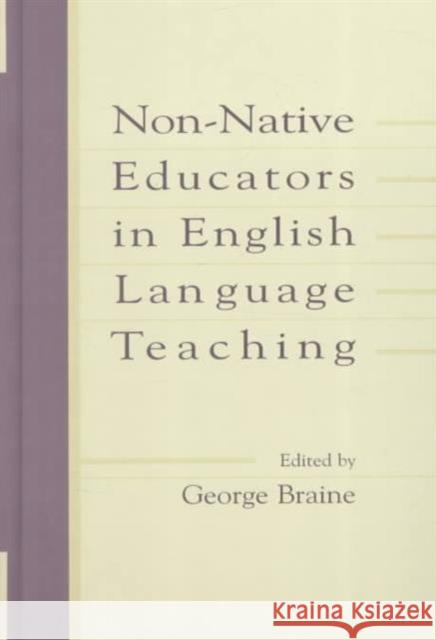Non-native Educators in English Language Teaching » książka
Non-native Educators in English Language Teaching
ISBN-13: 9780805832044 / Angielski / Twarda / 1999 / 256 str.
Non-native Educators in English Language Teaching
ISBN-13: 9780805832044 / Angielski / Twarda / 1999 / 256 str.
(netto: 720,05 VAT: 5%)
Najniższa cena z 30 dni: 654,86
ok. 16-18 dni roboczych.
Darmowa dostawa!
The place of native and non-native speakers in the role of English teachers has probably been an issue ever since English was taught internationally. Although ESL and EFL literature is awash, in fact dependent upon, the scrutiny of non-native learners, interest in non-natiove academics and teachers is fairly new. Until recently, the voices of non-native speakers articulating their own concerns have been even rarer. This book is a response to this notable vacuum in the ELT literature, providing a forum for language educators from diverse geographical origins and language backgrounds. In addition to presenting autobiographical narratives, these authors argue sociopolitical issues and discuss implications for teacher education, all relating to the theme of non-native educators in ETL. All of the authors are non-native speakers of English. Some are long established professionals, whereas others are more recent initiates to the field. All but one received part of the higher education in North America, and all except two of the chapters are at least partially contextualized in North America.
The place of native and non-native speakers in the role of English teachers has probably been an issue ever since English was taught internationally. Although ESL and EFL literature is awash, in fact dependent upon, the scrutiny of non-native learners, interest in non-native academics and teachers is fairly new. Until recently, the voices of non-native speakers articulating their own concerns have been even rarer.
This book is a response to this notable vacuum in the ELT literature, providing a forum for language educators from diverse geographical origins and language backgrounds. In addition to presenting autobiographical narratives, these authors argue sociopolitical issues and discuss implications for teacher education, all relating to the theme of non-native educators in ETL. All of the authors are non-native speakers of English. Some are long established professionals, whereas others are more recent initiates to the field. All but one received part of the higher education in North America, and all except two of the chapters are at least partially contextualized in North America.
Particularly relevant for non-native speakers who aspire to enter the profession, graduate students in TESOL programs, and teacher educators, the unique nature of this book's contributors and its contents will interest researchers and professionals in applied linguistics generally and in ELT, and all those who are concerned with the role of non-native speakers in English-language teaching.











